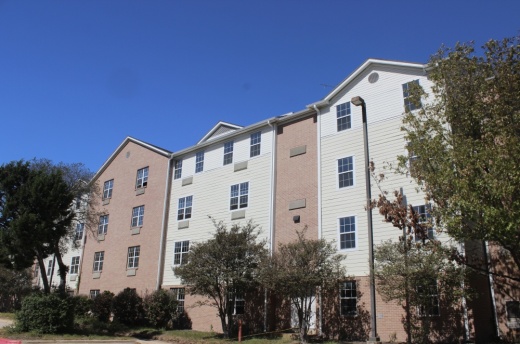The strategy is not new, but will expand over the coming months with several additions that will eventually be home to hundreds of low-income tenants. Former hotel sites in North Austin are being renovated as part of the city's own homeless strategy and are expected to house thousands in the coming years, in addition to nonprofit Foundation Communities' housing development work.
The newly-converted hotels will add to those already operating in the city, including Austin's two bridge shelters linked to its encampment-clearing HEAL initiative that has relocated more than 400 people since last spring.
Balcones Terrace
The Balcones Terrace project from Foundation Communities will provide more than 120 efficiency units in between an operating hotel and apartments in the Gateway neighborhood.
Balcones Terrace, located at 10024 N. Capital of Texas Hwy., will join other permanent supportive housing projects from Foundation Communities such as Skyline Terrace and Arbor Terrace in South Austin. Many apartments will be reserved for veterans and those exiting chronic homelessness.
"Homelessness is complex, and there’s lots of contributing factors and resources and solutions needed. But ultimately, if we don’t want campgrounds then we’ve got to have someplace for people to go," FC Executive Director Walter Moreau told Community Impact. "If people are going to move from a tent into a temporary or bridge housing situation, or a shelter, the next step beyond that is supportive housing."
The nonprofit's approximately $24 million project has been supported with city funds, including more than $18.58 million in loans backed by 2018 housing bond dollars. The city will also spend up to $4.5 million over five years for supportive housing services onsite.
Converted hotel rooms at Balcones Terrace range from around 300 to 525 square feet each and feature their own bathrooms, kitchenettes and appliances. Moreau said hotel conversions remain one of the faster and more cost-effective methods of securing housing for the homeless that give tenants their own personal space in addition to counseling and substance abuse support.
“Many residents just need that stable housing and help with a bus pass and help managing their money and with groceries," he said. "It’s not assisted living so it’s not like a skilled nursing home. It’s not that level of care, but it’s a whole range of other services, particularly around health.”

Some appliances and features will remain in place through the transition, and residents can also look forward to more amenities once the project is complete. Additions include a new central courtyard, laundromat, mailroom, computer lab, community kitchen, common areas and workspaces.
Letzerich said environmental considerations also played into the project. Updates include a modern drainage system beneath the site, specialized roofing and a focus on recycled materials in certain aspects of construction.
May Vlaming, MAPP's Austin vice president, said Balcones Terrace is not typically the kind of project the firm takes on. However, she credited Foundation Communities for backing the project and said the new housing will provide much-anticipated space for Austinites in need.
“Even though it’s not in our wheelhouse, it doesn’t mean that we wouldn’t want to be part of a project like this and really give back to the community," she said.
Construction at Balcones Terrace is expected to wrap up next spring before residents start moving in later in the year.
City hotel strategy continues

Similar conversions have also been embraced by Austin, with the city's next projects now several months away from welcoming their first residents.
The newest additions will join the existing Northbridge and Southbridge bridge shelters, the former hotels located just off I-35 in North and South Austin that were purchased in 2020 at a combined cost of $15.16 million. Northbridge now operates with a capacity for 70 residents and Southbridge with a capacity of 85.
Millions more have been dedicated to renovating two more hotel properties farther north that remain in progress and have attracted some controversy along the way. Those city hotel conversions for disabled tenants and those exiting chronic homelessness include Pecan Gardens at 10811 Pecan Park Blvd., and Bungalows at Century Park at 13311 Burnet Road.
Bungalows at Century Park will offer 60 supportive housing units, and Pecan Gardens will house 78 residents. Both properties were purchased by the city in 2021 at a combined cost of more than $16 million funded by the 2018 housing bond and Austin's portion of the federal American Rescue Plan Act relief package.
The city said earlier this fall that its overall hotel conversion strategy brings benefits including lower costs and shorter development timelines than new construction, and the ability to spread more housing across Austin where it is typically unavailable.
Northbridge and Southbridge now function as transitional spaces for residents between a move from an encampment into more permanent living situations. Those two shelters are exclusively used for the HEAL program and typically fill up after a new encampment is cleared.
With a need for more supportive units remaining throughout the community, the city is also considering additional hotel acquisitions to add to its shelter and housing portfolio.
Austin had planned to shut down Northbridge to convert its 70 apartments into housing by mid-2023 when options for its replacement would be considered. However, City Council passed a resolution Dec. 8 that will keep Northbridge functioning until a "comparable replacement" is operational. That item also directed staff to create a plan by mid-February to maintain around 150 shelter units in Austin specifically for HEAL regardless of other future shelter or housing acquisitions.
Additional instruction proposed by District 6 Council Member Mackenzie Kelly and approved by council will require further annual reporting about residents' stays in the city shelters.
While future hotel acquisitions have yet to be detailed, the current conversions on the city's north side remain underway. Renovations at Pecan Gardens and Bungalows at Century Park are expected to begin late this year or in early 2023, with move-ins following after about six months of construction.






